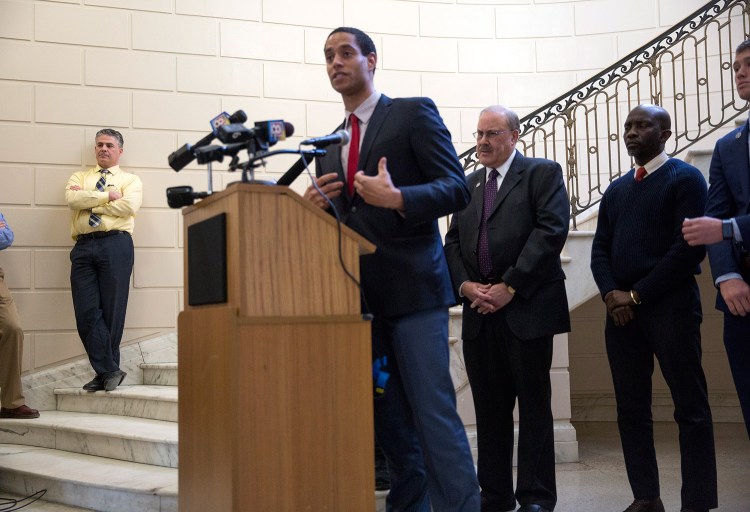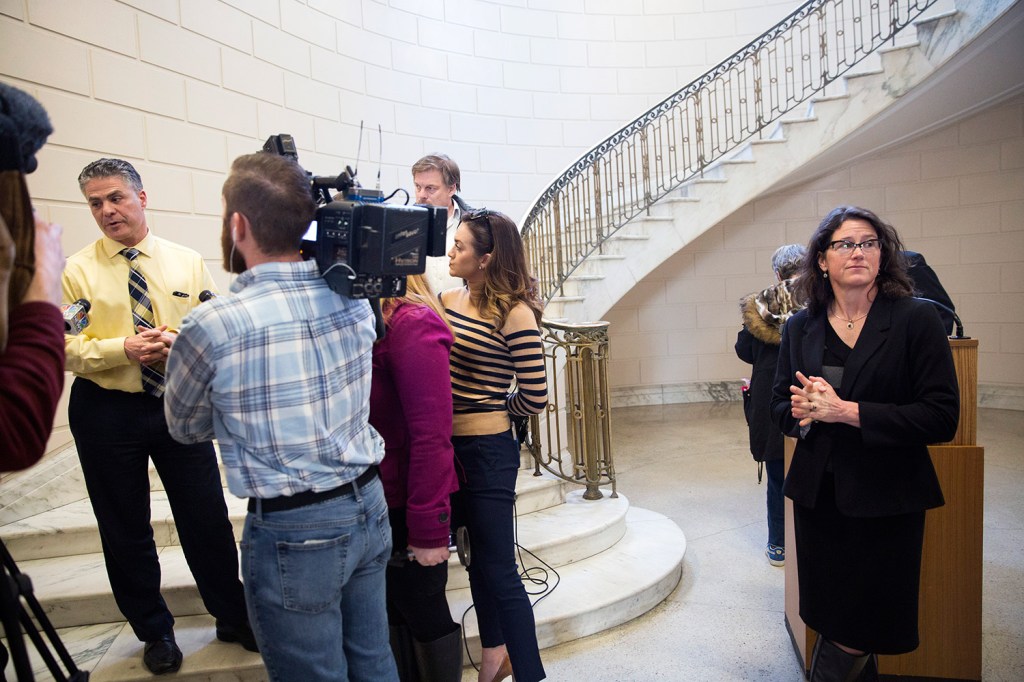About a dozen protesters interrupted a ceremony honoring Police Chief Michael Sauschuck Wednesday night.
The protesters, angered by the fatal shooting of a 22-year-old black man by a police officer on Saturday, stood up, raised their hands and began shouting as Sauschuck was being honored by the City Council for being named Police Chief of the Year for 2017 by the Maine Association of Police.
Mayor Ethan Strimling adjourned the meeting until the protesters left. One of them is heard on video taken by WMTW-TV saying “and good job murderer” as she walked past the chief on the way out,
Outside City Hall, the protesters chanted “black lives matter” as Sauschuck got in his vehicle and drove away. They refused to speak to a reporter.
“I fully believe in people’s right to speak and protest and bring forward their feelings,” Strimling said in an interview after the meeting. “I also feel very strongly the chief deserved that award tonight.”
Sauschuck did not respond to a request for comment Wednesday night.
The demonstration, which erupted just before an agenda item for a proclamation about Black History Month, was prompted by the fatal shooting of Chance David Baker, who was killed by a police officer responding to reports that Baker was pointing a gun at cars and shouting obscenities. Baker had bought the pellet rifle from Coastal Trading & Pawn in the Union Station Plaza on St. John Street and he was shot in the plaza parking lot after refusing to follow officers’ orders, police said.
The shooting already had become a political issue at City Hall before the protest Wednesday.
Only two hours earlier, six city councilors held a joint news conference to show support for both Sauschuck and his plan to implement the use of body cameras by his officers. They emphasized that Sauschuck had been working with City Manager Jon Jennings for nearly a year on the best way to roll out the cameras, including a pilot program for the next fiscal year.
“It is very important for the public to be engaged and critical of city leaders and officials,” Councilor Belinda Ray said. “It is very important to remember that when we talk about our police force we have example after example of Police Chief Michael Sauschuck being an exemplary leader and really standing up for the community.
“As not in vogue as it is to have trust in your leader – this is a leader who deserves some trust.”
TENSIONS AT CITY HALL
The news conference came two days after Strimling and advocacy groups including the American Civil Liberties Union of Maine called on the city to equip police officers with body cameras a year sooner than planned, in response to Saturday’s fatal shooting.
In another sign of tensions permeating City Hall, Strimling was not invited to participate in the councilors’ news conference and he watched it from a short distance away.
The councilors said the plan always has been to start out by equipping a few officers with cameras to test the program, while working on policies to guide usage, storage and public access to the recordings before equipping all officers with cameras beginning July 1, 2018.
“It’s not a secret,” City Councilor Jill Duson said. “It’s been on the table for development for a bit.”
Councilor David Brenerman said the city also needs to negotiate the use of body cameras with the police union, in addition to developing a policy that incorporates input from officers and the community.
“We can’t start this program tomorrow,” he said. “We need to do this is a way that’s right for this community.
In an interview, Jennings said that the city plans to use $25,000 in an existing U.S. Department of Justice grant to purchase eight cameras and possibly seek additional grant funding to expand the pilot program, if needed. He said the city asked the DOJ for permission to reallocate the grant money last week and expects a response within the next week or so.
After councilors said during the news conference that the city had funding for the pilot program, Strimling, who watched the event from the City Hall rotunda steps, said that was the first time he had heard that funding had been secured. He originally had planned on seeking $50,000 from the city’s Capital Improvements Plan.
“If the money is there – that’s a great step forward,” he said.
BODY CAMERA DEBATE
In the longer term, Portland has earmarked $400,000 in the 2019 budget to equip all officers with the cameras.
The shooting unfolded when police were called to Union Station Plaza on St. John Street after receiving reports of a man wielding a gun and pointing it at vehicles, while shouting obscenities. Police said the man, later identified as Baker, refused to follow orders from officers.
Baker was ultimately shot by Sgt. Nicholas Goodman, who has been placed on paid administrative leave, which is standard procedure while the incident is investigated by the Attorney General’s Office.
The Portland chapter of the NAACP and a newly formed political group, Progressive Portland, also have called on the city to speed up the implementation of body cameras.
During a news conference Tuesday, Sauschuck defended his officers and expressed support for body cameras. However, he said the presence of body cameras would not have made any difference in the outcome on Saturday. He also said that a police officer’s account of an incident is backed up 99.9 percent of the time by dashboard-mounted cameras, which have been used in cruisers for more than a decade.
Sauschuck also criticized Strimling and the advocacy groups, saying they were politicizing a tragedy that left a man dead. “I am saddened, I’m disappointed, and I’ll tell you I’m disgusted by any use of a tragedy to further some kind of political agenda around body cameras,” he said.
The national focus on body cameras arose after the Aug. 9, 2014, killing of Michael Brown, a black teenager in Ferguson, Missouri. Brown was shot by a white policeman who was later cleared of wrongdoing in the case. Intense scrutiny of the course of events, and early, sometimes contradictory information about how the shooting unfolded, led to widespread calls for more cameras and more transparency.
Now, federally funded research is underway to examine the cameras’ overall effect on law enforcement and community relations, and in 2015, the U.S. Justice Department offered $20 million in grants for departments to adopt the equipment and develop policies on their use.
South Portland police recently started using the cameras and initially drew criticism from civil liberties groups for not releasing their policies around the use of the technology.
Randy Billings can be reached at 791-6346 or at:
Send questions/comments to the editors.




